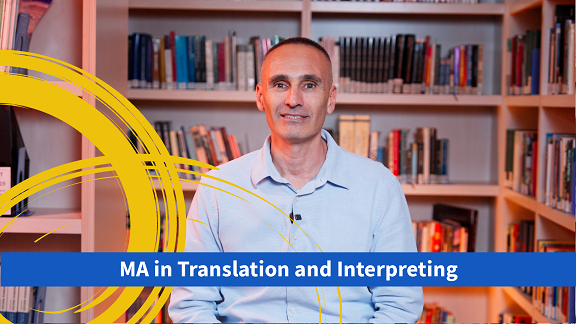MA in Translation and Interpreting
Overview
The MA in Translation and Interpreting is a comprehensive programme that academically and professionally trains translators and interpreters to gain proficiency for the job market in the multicultural and multilinguistic context of Kurdistan. Through studying in a rigorously-academic but also practice-driven field, students will be exposed to advanced topics in both translation and interpreting, which will equip them with an advanced level of theoretical and practical knowledge of translation and the cultural and linguistic competency needed in translating texts from English into Kurdish and vice versa. Moreover, the programme equips students with a research-oriented approach to learning about and investigating translation-related issues in a wide range of discourse and areas. In addition to translation, students will take modules in interpreting which combines both academic and professional aspects of interpreting including the skills and challenges of consecutive and simultaneous interpreting.
Universities invest vast resources in Translation degrees, and yet, consistently, graduate students with a deficient command of theoretical and practical knowledge, an inability to produce meaningful discourses in English/Kurdish and a lack of related soft skills required to enter the workforce. The UKH’s MA in Translation and Interpreting programme is set to deliver a superior outcome and will provide graduates with the skills and knowledge, which will enable them to effectively contribute to the future of Kurdistan and the larger world. Hence, the MA in Translation and Interpreting at UKH is structured in a way that covers the principal areas of Translation both as a scholarly and professional practice and responds to the peculiarities of the local market in Kurdistan. The rationale for this approach is also due to the realisation that to be competitive in today’s job market, graduates need to have acquired courses and materials that make them skilled, flexible and independent. In addition to two semesters of coursework, in their second year of studies, students will engage in postgraduate-level research to produce a scholarly empirical thesis in the areas of translation or interpreting under the supervision of the programme’s renowned academics.
Admission Requirements
- Undergraduate Degree: a BA in Translation, English or a related field with an overall average of 60% or above.
- English Language Proficiency: Minimum English Language requirement is 50 in PTE, 6.0 in IELTS -74in ibt-TOEFL or 105 in Duolingo.
- School Entrance test.
- School Interview.
- Equalised transcript is required for students who have graduated from international institutions/universities.
- Applicants dismissed for any reason from any university, school or college will not be considered.
- Application Form: Online application form is required.
- Official Transcripts: a copy of the applicant’s undergraduate transcript along with the application.
- Letters of Recommendation Two recommendation letters are required to be submitted with the application, preferably one of which will be from a university academic.
- School entrance test (Translation test from Kurdish to English and vice versa)
- A copy of your passport and national ID.
Curriculum
The Master of Arts in Translation and Interpreting is a two-year programme that presumes full-time study, 180 credits throughout two academic years. Some modules offered in the programme include Introduction to Translation Studies, Discourse Analysis in Translation, Consecutive Interpreting, Research Methods in Translation Studies, Translation Tools and Technologies, Technical Translation, Literary Translation and Simultaneous Interpreting.
Upon the completion of the coursework in the first year, the second year is devoted to work on an MA dissertation on a topic of Translation and Interpreting, which should typically be between 20,000 to 30,000 words. Candidates who successfully pass all taught courses of 120 credits in total but do not submit a dissertation or receive a no-pass mark for a dissertation may be awarded a Postgraduate Diploma. Only students who successfully complete the coursework and the dissertation will be awarded a Master of Arts in Translation and Interpreting.
| First Semester | Second Semester |
| 1- Introduction to Translation Studies | 1- Translation Tools & Technologies |
| 2- Research Methods in Translation Studies | 2- Technical Translation |
| 3- Text Analysis in Translation | 3- Literary Translation |
| 4- Best Practices in Consecutive Interpreting | 4- Simultaneous Interpreting |
Skills Development
Upon the completion of this degree, graduates are expected to have obtained the following learning outcomes:
· Display knowledge of the advanced theories and principles of translation and apply the correlative skills to produce translated texts in different areas and for a variety of purposes.
· Show awareness of thematic and information structures and the tension between word order and the communicative function of texts.
· Display understanding and skill in dealing with pitfalls in translating different genres.
· Develop ability to translate an authentic text from English to Kurdish and vice versa, following the required procedures and practices to achieve naturalness and accuracy.
· Interpret and apply skills acquired to interpret consecutively and simultaneously.
· Conduct critical comparisons and analyses of existing translations.
· Conduct specific research on a certain theory, trend and its application in the field of Translation and Interpreting in particular.
· Examine contemporary critical developments in Translation and Interpreting.
· Develop advanced skills in bringing up arguments, synthesizing and critically expressing opinions.
· Enhance advanced skills of research and presentation specific to English language; build scientific basis for further Doctorate research.
· Develop and assess the ideas of reading, re-reading and interpretation.
